 Paris Hilton's gift guide is more lit than a Christmas tree. As Cyber Monday deals are drawing fashionistas and beauty aficionados to their online carts, the pop star is revealing...
Paris Hilton's gift guide is more lit than a Christmas tree. As Cyber Monday deals are drawing fashionistas and beauty aficionados to their online carts, the pop star is revealing...from E! Online (US) - lifestyle https://ift.tt/2FJVrbf
 Paris Hilton's gift guide is more lit than a Christmas tree. As Cyber Monday deals are drawing fashionistas and beauty aficionados to their online carts, the pop star is revealing...
Paris Hilton's gift guide is more lit than a Christmas tree. As Cyber Monday deals are drawing fashionistas and beauty aficionados to their online carts, the pop star is revealing...Alexandre Meregan says that music, and audio in general, has always been core to his life. But one day on his five-minute commute to work, trying to listen to a podcast for the first time, he realized that by the time he arrived at work he had only heard an introduction and a commercial jingle.
He immediately went to work on Koo!, a short-form podcast app aimed at young people. Koo! lets users record up to one minute of audio, add “sound stickers” like a drum roll or a poop sound, and share the “Koo” in a feed with their friends and followers.
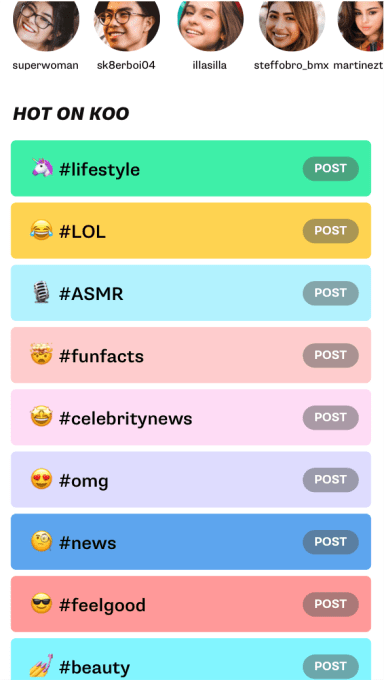 Meregan believes that some young people are hesitant to share their thoughts on social media, which is mostly picture or video-based, because of the quantification of their self-worth through Like counters. With Koo! users can simply speak their thoughts without having to share a picture or video.
Meregan believes that some young people are hesitant to share their thoughts on social media, which is mostly picture or video-based, because of the quantification of their self-worth through Like counters. With Koo! users can simply speak their thoughts without having to share a picture or video.
“At Koo! we believe a lot of great content is being held back by teenagers due to insecurities that comes with photo and video,” said Meregan onstage at TechCrunch Disrupt Berlin on the Startup Battlefield. “We feel that what you say should be more important than how you look.”
Like most social networks, Koo! is primarily focused on acquiring new users before focusing on a revenue model. Ad-supported revenue is the most obvious option to make money, but Meregan says that the team has been floating around a few other ideas, as well.
[gallery ids="1752074,1752075"]One user-acquisition tactic, according to Meregan, is to target YouTube content creators and give them a complimentary service to share their thoughts and voice.
A handful of startups have tried their hand at audio-based social networks, but few have managed to gain much traction.
Koo! is backed by Sweet Studio, though Meregan declined to share the amount of funding the company has received to date.
It can be tough for diabetes patients to keep a constant eye on their glucose levels. Spike Diabetes lets family and doctors lend a hand by sending them real-time alerts about the patient’s stats. And the app’s artificial intelligence features can even send helpful reminders or suggest the most diabetes-friendly meals when you walk into a restaurant.
Today onstage at TechCrunch Disrupt Berlin Startup Battlefield, Spike Diabetes is launching its Guardian Portal so loved ones with permission can get a closer look at a patients’ data and coach them about staying healthy.
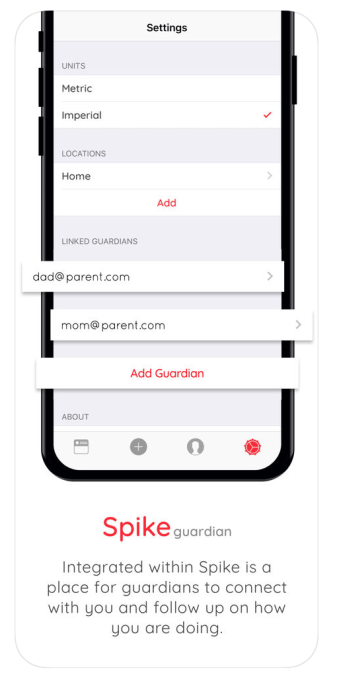 “Diabetes is an incurable chronic disease that forces diabetics to live a life of carb-counting and insulin injections,” says Spike co-founder Ziad Alame. “Since diabetics are forced to do those mundane tasks for the rest of their lives, they tend to fall off the tracks sometimes simply because of how demanding those tasks can be. As for guardians and parents, they are left in the dark about their loved ones.”
“Diabetes is an incurable chronic disease that forces diabetics to live a life of carb-counting and insulin injections,” says Spike co-founder Ziad Alame. “Since diabetics are forced to do those mundane tasks for the rest of their lives, they tend to fall off the tracks sometimes simply because of how demanding those tasks can be. As for guardians and parents, they are left in the dark about their loved ones.”
With doctors often only getting data during quarterly or semi-annual checkups, patients are often left on their own. “A lifetime of management is very stressful, especially if your life depends on it.”
The startup faces stiff competition from literally hundreds of apps claiming to help patients monitor their vitals. MySugr, Diabetes Connect and Health2Sync are among the most popular. But Alame says many require users to track their levels through complex spreadsheets.
Spike offers customizable mobile charts, and will even read users their stats out loud to make staying safe an easier part of daily life. Spike is invite-only and just on iOS, but it also touts an Apple Watch app plus optimized engineering to minimize battery usage.
“Spike started off as a personal project to help myself adhere better to my medication after reaching critical times in my diabetic life,” Alame tells me. Now he’s bringing to the problem his experience as CTO of the GivingLoop charity platform, TeensWhoCode summer camp and Zoomal crowdfunding site for the Arab world.
Alame has assembled a team of diabetics, engineers and PhDs, plus $200,000 in seed funding from MEVP, Cedar Mundi and Phoenician Funds. They hope to see the premium paid version of Spike’s freemium app overtake longstanding competition through word-of-mouth triggered by bringing loved ones and doctors into the loop.
One of the app’s most interesting features is the proactive info it delivers. “For example, you walk into McDonald’s around 2 PM. Spike would automatically know it’s lunch time for you and suggest the top three options you can have with approximate carb counts,” Alame tells me.
“After some time (~25 minutes) Spike automatically reminds you of your insulin and syncs with your diabetic devices to log all the details. With time, as the app gets to know the diabetic’s taste more, Spike would be able to suggest small behavioral tweaks to enhance lifestyle such as walking routes suggestions or new places similar to the diabetic’s taste but with a lower insulin consumption rate.”

Alame jokes that “The biggest risk [to Spike] is the best thing that can happen — which is finding a cure for diabetes.” But even if that happens, he believes Spike’s app for tracking and actively coaching users could be relevant to other diseases, as well. For now, though, it will have to convince users that an app could make managing diabetes simpler rather than more complex.
Facebook pissed off journalists earlier this year when it announced that ads run by news publishers to promote their articles involving elected officials, candidates and national issues would have to sport “paid for by…” labels and be included alongside political campaign ads in its ads transparency archive that launched in June, albeit in a separate section. The News Media Alliance — representing 2,000 newspapers, including The New York Times and NewsCorp, plus other new organizations — sent a letter to Mark Zuckerberg in June protesting their inclusion. They claimed it would blur the lines between propaganda and journalism, and asked Facebook to exempt news publishers.
Now Facebook has granted that exception. Next year once Facebook has figured out more ways to verify legitimate news organizations that publish with bylines and dates, cite sources and don’t have a history of having stories flagged as false by third-party fact checkers, they’ll no longer have their U.S. ads appear in the Ads Archive. They also won’t have to carry a “Paid for by…” label when they appear in the News Feed or Instagram. News organizations will still have to verify their identity, but not through the political ads process. This exemption will roll out today in the U.K.
The change will also allow news outlets to run “dark post” ads that target specific users but don’t appear on their Pages. This will allow them to secretly test different ad variants without being exposed to potential criticism or competitors looking to copy their ad strategies.
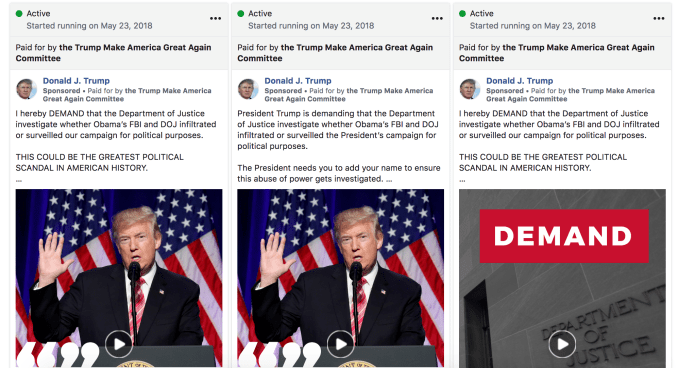
Facebook’s political ads archive of campaign ads will no longer include publications promoting articles about politics or issues
Facebook will be using its recently built news publisher index to which outlets can apply to decide which ad buyers are exempt. That index is up and running in the U.S. and will expand to other countries, but Facebook still wants to build more safeguards against fake news outlets before starting the exemption in the U.S. For now, Facebook is using a third-party list of legitimate U.K. news outlets that’ll be exempted starting today. Jason Kint of publishers association Digital Content Next tells TechCrunch, “We are pleased that Facebook understands and values the important role of news organizations. We have worked cooperatively with Twitter who understood this from the beginning. We look forward to working in a similar fashion with Facebook.”
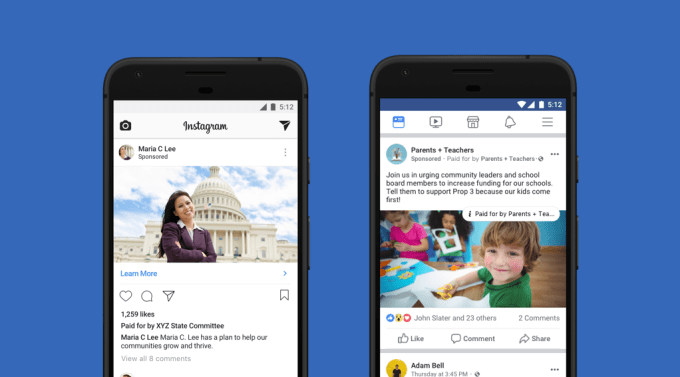
Facebook’s “Paid for by…” labels will no longer appear on news publishers’ ads on Facebook or Instagram
The change comes as Facebook rolls out enforcement of its political ads transparency rules in the U.K. today. “Now political advertisers must confirm their identity and location, as well as say who paid for the ad, before they can be approved to run political ads on Facebook and/or Instagram,” Facebook tells TechCrunch. These ads will also feature the “Paid for by…” label. Facebook hoped that by self-regulating ads transparency, it might avoid more heavy-handed government regulation, such as through the U.S.’s proposed Honest Ads Act that would bring internet political advertising to parity with transparency rules for television commercials.
The hope is that by determining who is paying for these ads, properly labeling them and exempting journalists, Facebook will be able to better track foreign misinformation campaigns and election interference. Meanwhile, users will have a better understanding of who’s funding the political and issue ads they see on Facebook.
[Update: This story has been updated to reflect that the news publisher exemption won’t roll out for U.S. outlets until next year.]












Perth’s single-stage Hidden festival has announced its expansion into Sydney and Brisbane, as well as its all-important 2019 lineup, topped by the likes of bubblegum trap rapper Lil Yachty and US producer Kayzo.
The festival will hit up Brisbane’s Victoria Parklands in February, before making its way to Sydney Showground and Perth’s Belvoir Amphitheatre in March, boasting other acts like 22-year-old Florida rapper Ski Mask The Slump God and British melodic trap producer TroyBoi.
“After two great years of events in Perth we are ready to fill the much needed void for a place where like minded underground music lovers can get together and celebrate,” says Hidden’s Zac Montague.
“We can’t wait for everyone to discover Hidden.”
The rap and bass-heavy lineup also features Adelaide artist Godlands, and you can view the full list of acts and festival dates down below.
Tier One
KAYZO
LIL YACHTY
SKI MASK THE SLUMP GOD
TROYBOI
Tier Two
CRAY
GENTLEMENS CLUB
GODLANDS
J.I.D
Tickets on sale 7pm local time Thursday, 6th December
Saturday, 23rd February
Victoria Parklands, Brisbane
Tickets: Official Website
Saturday, 2nd March
Sydney Showground, Sydney
Tickets: Official Website
Sunday, 3rd March
Belvoir Amphitheatre, Perth
Tickets: Official Website
The post Perth’s ‘Hidden’ Festival Expands To Sydney & Brisbane, Confirms Lil Yachty & More On 2019 Lineup appeared first on Music Feeds.
Federal Labor has included a promise to fight ticket scalpers in its just-announced $28 million pledge for Australia’s music industry.
The funds will go towards music programs and education over three years, if the opposition party is elected in the 2019 federal election.
Labor plans to discourage ticket scalpers by banning the use of ticket-buying ‘bot’ software and capping ticket resale prices at a national level.
Labor has also promised to double the funding for the New Recordings program, which will help 20 Australian artists record an EP, up from 10. The program has previously supported the likes of Courtney Barnett and Alex The Astronaut.
Labor’s policy also includes $10 million for Sounds Australia, $7 million for music education programs (including SongMakers and Song Room), $5 million for community music hubs and $4.2 million for music industry mental health charities Nordoff Robbins and Support Act.
“The policies we are announcing today are aimed at boosting every aspect of Australian music. We want Australian music to be heard, Australian artists to stay in the industry and the next generation to be inspired,” Labor said in a statement.
“We believe in what our songwriters, musicians, performers and music industry do. We think it matters. Our Australian soundtrack matters. Let’s turn up the volume.”
Labor’s announcement comes after the launch of a renewed campaign to banish controversial Swiss-based ticket resale site Viagogo from Australia.
The campaign, led by Lunatic Entertainment, has received support from the likes of Gang Of Youths, Laneway Festival and Tash Sultana.
Viagogo last year won an award for being “as reliable as a scalper in a back alley”, and is often used by scalpers to sell overpriced tickets, while charging exorbitant fees in the process.
The company has previously been taken to court by The Australian Competition and Consumer Commission (ACCC), after it received more than 400 complaints about the organisation in one year.
The post Labor Promises To Fight Ticket Scalpers, Pledges $28 Million For Australian Music appeared first on Music Feeds.
The creative director of Tasmania’s Dark Mofo festival has thrown his weight behind pill testing.
As the state’s politicians continue to debate whether or not the life-saving drug analysis measures should be made legal, Leigh Carmichael has issued a call to all political parties to “stop playing politics with young Tasmanian lives”.
“Everyone wants to see a reduction in the use of illegal drugs,” he says in a statement. “We know drug use happens, particularly in environments like music festivals, so we must do what we can to reduce the risk of harm or death.
“We do not condone or seek to normalise illicit drug use, and we don’t wish to undermine the important work of Tasmania Police.”
He continues: “Whether it’s through legislation, or in a pilot trial like the ACT government supported earlier this year, pill testing is a harm minimisation approach that must be adopted urgently.
“We have a duty of care to our audience, and saving lives is more important than any political game around this issue.”
Yesterday, a move to establish a legal framework to enable a pill testing trial for Tasmanian festivals failed in state parliament.
Greens justice spokeswoman Rosalie Woodruff presented the bill, but it was not supported by the labor party, despite them passing their own motion to support pill testing two years ago.
Labor justice spokeswoman Ella Haddad said they voted against the bill because the Greens failed to take consultation before presenting it to parliament.
Meanwhile, as The Advocate reports, Attorney-General Elise Archer said the bill’s exemption from criminal charges for people who tested drugs went against state and national laws.
Nevertheless, an Australian-first pill testing trial took place at the Canberra leg of Groovin The Moo in April.
While the landmark trial came back with some disturbing details about some of the 83 drugs tested, the upshot of those results was that many of the punters who owned the bad drugs decided to bin them rather than risk their lives, causing many commentators to hail the whole thing a big success.
In August, a $100,000 fundraiser was also launched to help support the roll out of pill testing programs at more Australian music festivals, following the successful Groovin The Moo trial.
The post Dark Mofo Director Backs Pill Testing In Tasmania appeared first on Music Feeds.
Following a flopped IPO in 2012, Facebook desperately brainstormed new ways to earn money. An employee of unknown rank sent an internal email suggesting Facebook charge developers $250,000 per year for access to its platform APIs for making apps that can ask users for access to their data. Employees also discussed offering Tinder extended access to users’ friends’ data that was being removed from the platform in exchange for Tinder’s trademark on “Moments”, which Facebook wanted to use for a photo sharing app it later launched. Facebook decided against selling access to the API, and did not strike a deal with Tinder or other companies including Amazon and Royal Bank Of Canada mentioned in employee emails.
The discussions were reported by the Wall Street Journal as being part of a sealed court document its reporters had reviewed from a lawsuit by bikini photo finding app developer Six4Three against Facebook alleging anti-competitive practices in how it changed the platform in 2014 to restrict access to friends’ data through the platform.
The biggest question remaining is how high in rank the employees who discussed these ideas were. If the ideas were seriously considered by high-ranking executives, especially CEO Mark Zuckerberg, the revelation could contradict the company’s long-running philosophy on not selling data access. Zuckerberg told congress in April that “I can’t be clearer on this topic: We don’t sell data.” If the discussion was between low-level employees, it may have been little more than an off-hand suggestion as Facebook was throwing ideas against the wall, and may have been rejected or ignored by higher-ups. But either way, now that the discussion has leaked, it could validate the public’s biggest fears about Facebook and whether it’s a worthy steward of our personal data.
An employee emailed others about the possibility of removing platform API access “in one-go to all apps that don’t spend… at least $250k a year to maintain access to the data”, the document shows. Facebook clarified to TechCrunch that these discussions were regarding API access, and not selling data directly to businesses. The fact that the discussions were specifically about API access, which Facebook continues to give away for free to developers, had not been previously reported.

Facebook provided this full statement to TechCrunch:
“As we’ve said many times, the documents Six4Three gathered for this baseless case are only part of the story and are presented in a way that is very misleading without additional context. Evidence has been sealed by a California court so we are not able to disprove every false accusation. That said, we stand by the platform changes we made in 2015 to stop a person from sharing their friends’ data with developers. Any short-term extensions granted during this platform transition were to prevent the changes from breaking user experience. To be clear, Facebook has never sold anyone’s data. Our APIs have always been free of charge and we have never required developers to pay for using them, either directly or by buying advertising.”
A half decade-later, with the world’s will turned against Facebook, the discussions of selling data access couldn’t come at a worse time for the company. Even if quickly aborted, the idea could now stoke concerns that Facebook has too much power and too much of our personal information. While the company eventually found other money-makers and became highly profitable, the discussions illuminate how Facebook could potentially exploit people’s data more aggressively if it deemed it necessary.
Facebook has a new area of its app it will have to police for fake news and biased sensationalism. Facebook is launching “Today In”, its local news aggregator it began testing in January, in 400 small to medium-sized US cities. It’s also now testing it in its first overseas spot in Australia. iOS and Android users can open the Today In bookmark or opt in to getting digests of its local news in their feed. The feature includes previews that link out to news sites about top headlines, current discussions, school announcements and more.
“We have a number of misinformation filters in place to ensure that fake news and clickbait does not surface on Today In. We also provide people the ability to report suspicious content on Facebook and within Today In specifically” a Facebook spokesperson tells me. “The misinformation filters are the same across Facebook that we’ve previously talked about – downranking clickbait, ratings from third-party fact checkers” they said. However, “the content in the surface is pulled by algorithm”, so there’s always a chance that problematic content slips through. For now, there will be no ads in Today In.
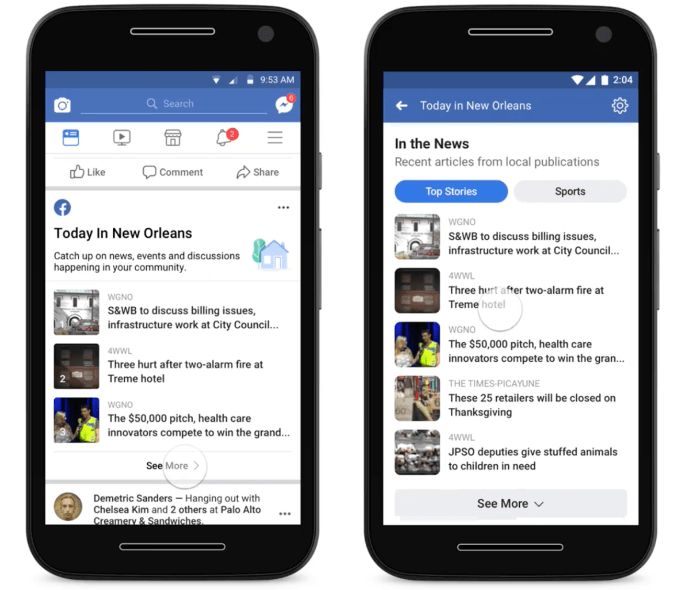
Facebook is also now testing Local Alerts with 100 local government and first responder Pages that can be issued to inform citizens about urgent issues or emergencies, such as where to take shelter from a hurricane. The Local Alerts are delivered via News Feed, Today In, and Pages can also target users with notifications about them. Again, while Facebook may be vetting which Pages get access to the Local Alerts feature, it must closely monitor to make sure they’re using it to provide vital info to their communities rather than just grab traffic at sensitive moments.

Facebook is hoping to fill a void after surveys found 50 percent of users wanted more local news through Facebook. It previously tested Today In with New Orleans, La.; Little Rock, Ark.; Billings, Mont.; Peoria, Ill.; Olympia, Wash.; and Binghamton, N.Y. The feature could give local outlets a referral traffic boost that could help offset the fact that Facebook has drained ad dollars from journalism into its own News Feed ads. And to make sure “news deserts” without enough local outlets still have robust Today In sections, Facebook will collect headlines from surrounding areas.
But the launch also opens up a new vector for policy issues, and it’s curious that Facebook would push forward on this given all its policy troubles as of late. It will have to ensure that Today In only aggregates content from reliable and fact-focused local outlets and doesn’t end up peddling fake news. But that in turn could open it to criticism suggesting it’s biased against fringe political outlets that believe their clickbait is the real story.
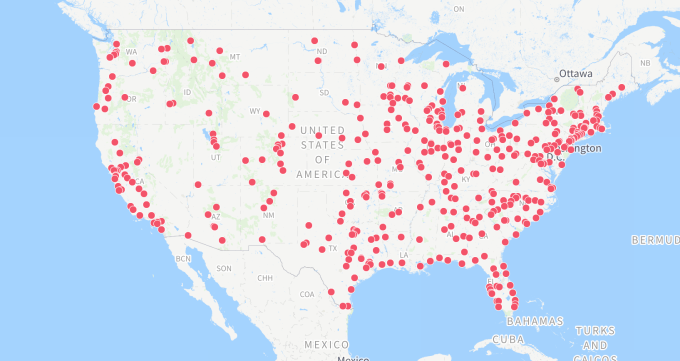
Users who want to check if they have access to Today In can visit this interactive map. The list includes Facebook’s hometown of Menlo Park and nearby Oakland, but not San Francisco. It’s also skipping big cities like New York and Washington, D.C. in favor of places like Mobile, Alabama; and Provo, Utah.
To find the mobile-only feature in Facebook (there’s no desktop version), users will hit the three-line “More” hamburger button and scroll down looking for “Today In [their city]”. Otherwise, they may stumble across one of its digests showing the headlines, thumbnail images, and publications for three of the biggest local news stories.
After tapping through or opening the Today In bookmark, they’ll be able to horizontally swipe through different sections like In The News that features recent stories and can be toggled to display sports. As per usual, Facebook isn’t above promoting its own content, like user and Page News Feed posts discussing local topics, Groups you could join, or Events you could RSVP to. Once you hit the end of a daily edition, you’ll see a “You’re all caught up” notice, similar to Instagram’s feature designed to keep you from over-scrolling.
Today In: Facebook’s local news and information section
Posted by Facebook on Friday, September 21, 2018
Facebook infamously turned away from news in favor of content from friends at the start of 2018, precipitating a significant decline in News Feed reach and referral traffic for links to articles. That left a lot of outlets feeling burned, as many had staffed up thanks to the that flow of traffic and the ad dollars it generated. Now some are having to lay off journalists, especially those making video content that Facebook also dialed down.
By resurfacing local news, Facebook could help strengthen ties in local communities as part of its new mission statement to “bring the world closer together”. But if that news contains heavy partisan bias or hypes up nothingburgers, it could lead to more polarization. Facebook already has trouble finding enough third-party fact checkers to verify viral news stories. Now it may expose itself to even more liability to be the arbiter of truth now that it’s fragmented the news space into hundreds of distinct digests.
This conundrum will play out again and again. Facebook wants to keep pushing forward with product launches it thinks can help society, but it in turn takes on even greater responsibility to protect us that it hasn’t proven it deserves.
A new app called Playlist aims to make music a more social experience than what’s offered today by the major music platforms like Apple Music, Pandora or Spotify, for example. In Playlist, you can find others who share your musical tastes and join group chats where you listen to playlists together in real time. You can collaborate on playlists, too.
The app, backed by investment from Stanford’s StartX fund, was founded by Karen Katz and Steve Petersen, both Stanford engineers and serial entrepreneurs. Katz previously co-founded AdSpace Networks and the social music platform, Jam Music, which served as the Playlist beta. She also was a founding executive team member at Photobucket, and founded a company called Project Playlist, which was like a Google search for music back in the Myspace era.
Peterson, meanwhile, has 35 patents and more than a decade of experience in digital music. In the early 2000s he created the software architecture and ran the team at PortalPlayer Inc., which powered the iPod’s music player and was later sold to Nvidia for $357 million. Afterwards, he was CTO at Concert Technology, a technology incubator and intellectual property company with a focus on mobile, social and digital music services.
Chris Obereder was CMO of Jam Music, and was added as a Playlist co-founder while the service was in beta, says Katz. He’s a growth hacker, app developer, game developer, and is now helpling Playlist onboard influencers to its service.

“The world has gone social, but music has been largely left behind. That’s a real gap,” explains Katz, as to why the founders wanted to build Playlist in the first place.
“Ever since we started listening to music from our mobile phones, it’s become an isolated experience. And music is the number one thing we do on our phones,” she says.
The idea they came up with was to unite music and messaging by synchronizing streams, so people could listen to songs together at the same time and chat while they do so.
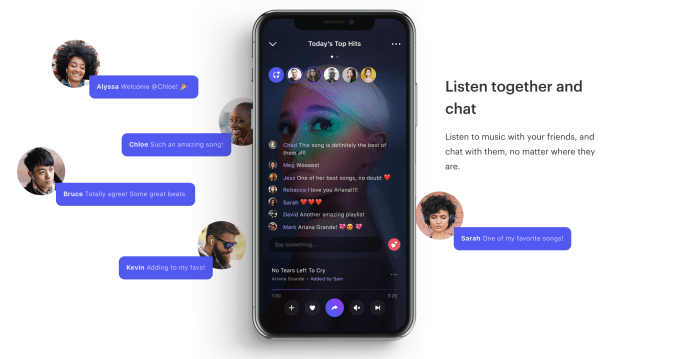
During last year’s beta testing period, Playlist (which was listed under a different name on the App Store), saw a huge number of engagements as a result of its real-time nature.
“Out of the gate, we saw 10 times the engagement of Pandora. People have, on average, 60 interactions per hour — like chats, likes, follows, joins, adds and creates,” Katz says.
Under the hood, the app uses a lot of technology beyond just its synchronized streaming. It also leverages machine learning for its social recommendations, as well as collaborative playlists, large-scale group chat, and behavior-based music programming, and has “Music Match” algorithms to help you find people who listen to the same sort of things you do.
The social aspects of the app involves a following/follower model, and presents playlists from the people you follow in your home feed, much like a music-focused version of Instagram. A separate Discover section lets you find more people to follow or join in other popular listening and chat sessions.
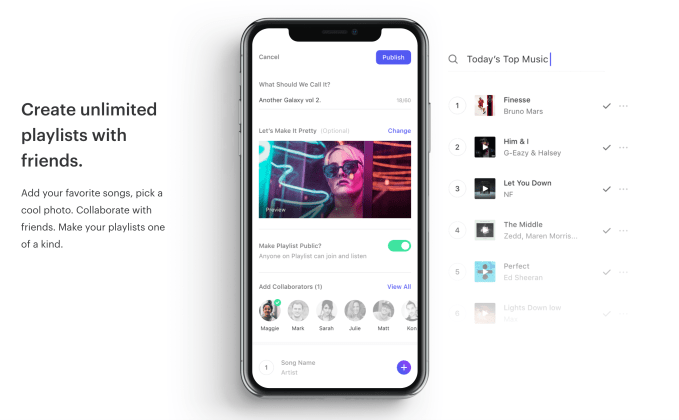
At launch, the app has a catalog of more than 45 million songs and has a music license for the U.S. It plans to monetize through advertising.
The core idea here — real-time music listening and chat — is interesting. It’s like a Turntable.fm for the Instagram age. But the app sometimes overcomplicates things, it seems. For example, importing a playlist from another music app involves switching over to that app, finding the playlist and copying its sharing URL, then switching back to Playlist to paste it in a pop-up box. It then offers a way for you to add your own custom photo to the playlist, which feels a little unnecessary as the default is album art.
Another odd choice is that it’s difficult to figure out how to leave a group chat once you’ve joined. You can mute the playlist that’s streaming or you can minimize the player, but the option to “leave” is tucked away under another menu, making it harder to find.
The player interface also offers a heart, a plus (+), a share button, a mute button and a skip button all on the bottom row. It’s… well… it’s a lot.

But Katz says that the design choices they’ve made here are based on extensive user testing and feedback. Plus, the app’s younger users — often high schoolers, and not much older than 21 — are the ones demanding all the buttons and options.
It’s hard to argue with the results. The beta app acquired more than 500,000 users during last year’s test period, and those users are being switched over to the now publicly available Playlist app, which has some 80K installs as of last week, according to Sensor Tower data.
The company also plans to leverage the assets it acquired from the old Project Playlist, which includes some 30 million emails, 21 million Facebook IDs and 14 million Twitter IDs. A “Throwback Thursday” marketing campaign will reach out to those users to offer them a way to listen to their old playlists.
The startup has raised $5 million in funding (convertible notes) from Stanford StartX Fund, Garage Technology Ventures, Miramar Ventures, IT-Farm, Dixon Doll (DCM founder), Stanford Farmers & Angels, Zapis Capital and Amino Capital.
The Palo Alto-based company is a team of six full-time.
Playlist is a free download for iOS. An Android version is in the works.
A grand committee of international parliamentarians empty-chaired Mark Zuckerberg at a hearing earlier today, after the Facebook founder snubbed repeat invitations to face questions about malicious, abusive and improper uses of his social media platform — including the democracy-denting impacts of so-called “fake news.”
The U.K.’s DCMS committee has been leading the charge to hold Facebook to account for data misuse scandals and election interference — now joined in the effort by international lawmakers from around the world. But still not by Zuckerberg himself.
In all, parliamentarians from nine countries were in the room to put awkward questions to Zuckerberg’s stand-in, policy VP Richard Allan — including asking what Facebook is doing to stop WhatsApp being used as a vector to spread political disinformation in South America; why Facebook refused to remove a piece of highly inflammatory anti-Muslim hate speech in Sri Lanka (until the country blocked access to its platform); how Facebook continues to track non-users in Belgium and how it justifies doing so under Europe’s tough new GDPR framework; and, more generally, why anyone should have any trust in anything the company says at this point — with the company neck-deep in privacy and trust scandals.
The elected representatives were collectively speaking up for close to 450 million people across the U.K., Argentina, Belgium, Brazil, Canada, France, Ireland, Latvia and Singapore. The most oft-repeated question on their lips was why wasn’t Zuckerberg there?
9 countries.
24 official representatives.
447 million people represented.One question: where is Mark Zuckerberg? pic.twitter.com/BK3KrKvQf3
— Digital, Culture, Media and Sport Committee (@CommonsCMS) November 27, 2018
Allan looked uncomfortable on his absentee boss’ behalf and spent the best part of three hours running the gamut of placative hand gestures as he talked about wanting to work with regulators to find “the right regulation” to rein in social media’s antisocial, anti-democratic impacts.
Canadian MP Bob Zimmer spoke for the room, cutting into another bit of Allan’s defensive pabulum, with: “Here we are again hearing another apology from Facebook — ‘look trust us, y’all regulate us etc but we really don’t have that much influence in the global scheme of things.’
“In this room we regulate over 400 million people and to not have your CEO sit in that chair there is an offence to all of us in this room and really our citizens as well.”
“[BlackBerry co-founder] Jim Balsille said, when I asked him on our committee, is our democracy at risk if we don’t change the laws in Canada to deal with surveillance capitalism?” Zimmer continued. “He said: ‘Without a doubt’. What do you think?” — which Allan took as a cue to ummm his way into another series of “we need tos” and chatter about “a number of problematic vectors” he said Facebook is trying to address with a number of “tools.”
The session was largely filled up with such frustratingly reframed waffle, as Allan sought to deflect, defang and defuse the committee’s questions — leading it to accuse him more than once of repeating the “delay, deny, deflect” tactics recently reported on by The New York Times.
Allan claimed not — claiming to be there “acknowledging” problems. But that empty chair beside him sure looked awkward.
At the close, Canada’s Charlie Angus sought to sweep Facebook’s hot air away by accusing Allan of distracting the debate with discussion of symptoms — to draw the regulatory eye away from the root cause of the problem which he sharply defined as Facebook itself.
“The problem we have with Facebook is there’s never accountability. So I would put it to you when we talk about regulation that perhaps the best regulation would be antitrust,” said Angus. “Because people who don’t like Facebook — oh they could go to WhatsApp. But oh we have some problems in South America, we have problems in Africa, we have to go back to Mr Zuckerberg who’s not here.
“My daughters could get off Facebook. But they’d go to Instagram. But that’s now controlled by Facebook. Perhaps the simplest form of regulation would be to break Facebook up — or treat it as a utility so that we could all then feel that when we talk about regulation we’re talking about allowing competition, counting metrics that are actually honest and true, and that Facebook has broken so much trust to allow you to simply gobble up every form of competition is probably not in the public interest.
“So when we’re talking about regulation would you be interested in asking your friend Mr Zuckerberg if we could have a discussion about antitrust?”
Allan reached for an “it depends upon the problem we’re trying to solve” reply, to try reframing the question again.
“The problem is Facebook,” retorted Angus. “We’re talking about symptoms but the problem is the unprecedented economic control of every form of social discourse and communication. That it’s Facebook. That that is the problem that we need to address.”
Committee chair Damian Collins also gave short shrift to Allan’s attempt to muddily reframe this line of questioning — as regulators advocating “turning off the internet” (instead of what Angus was actually calling for: A way to get “credible democratic responses from a corporation”) — by interjecting: “I think we would also distinguish between the internet and Facebook to say they’re not necessarily the same thing.”
The room affirmed its accord with that.
At the start of the session Collins revealed the committee would not — at least for now — be publishing the cache of documents it dramatically seized this weekend from the founder of a startup that’s been suing Facebook since 2015, saying it was “not in a position to do that.” Though at a later press conference he said the intent is to publish the documents.
At several points during the session DCMS committee members also appeared to tease some new details culled from the documents, asking for example whether Facebook had ever made API decisions for developers contingent on them taking advertising on its platform.
Allan said it had not — and appeared to be attempting to suggest that the emails the committee may have been reading were the result of “normal” internal business discussions about how to evolve Facebook’s original desktop-based business model for the mobile-first era.
Collins did detail one piece of new information during the hearing which he categorically identified as having been sourced from the seized documents — and specifically from an internal email sent by a Facebook engineer dating from October 2014 — suggesting this item looked to be of significant public interest.
“An engineer at Facebook notified the company in October 2014 that entities with Russian IP addresses had been using a Pinterest API key to pull over 3 billion data points a day through the ordered friends API,” he revealed, asking Allan whether Facebook reported that “to any external body at the time?”
The Facebook VP responded by characterizing the information contained in the seized documents as “partial,” on account of it being sourced via a “hostile litigant.”
“I don’t want you to use this opportunity just to attack the litigant,” retorted Collins. “I want you to address the question… What internal process [Facebook] ran when this was reported to the company by an engineer? And did they notify external agencies of this activity? Because if Russian IP addresses were pulling down a huge amount of data from the platform — was that reported or was that just kept, as so often seems to be the case, just kept within the ‘family’ and not talked about.”
“Any information you have seen that’s contained within that cache of emails is at best partial and at worst potentially misleading,” responded Allan. “On the specific question of whether or not we believe, based on our subsequent investigations, that there was activity by Russians at that time I will come back to you.”
We reached out to Pinterest to ask whether Facebook ever informed it about such an abuse of its API key. At the time of writing it had not responded to our request for comment.
Update: A spokesperson for Pinterest told us: “We’re currently investigating and have reached out to Facebook for any information they may have.”
In another development after the hearing, Facebook also unsealed a selection of the documents Collins had been referring to (below) — which appear to suggest there was no external investigation of the Pinterest incident.
Facebook have broken the seal on the court documents from California; will they now ask for the rest to be released? These emails show there was no external investigation of Russian IP addresses calling for Facebook data & don’t confirm how much was taken. https://t.co/5l49CnWtXU
— Damian Collins (@DamianCollins) November 28, 2018
This report was updated with comment from Pinterest and to note additional developments
Facebook Watch has failed to capture viewers with its content, so it’s hoping to differentiate through the company’s core strength: social. Today Facebook fully launches Watch Party, its co-viewing feature where users can see and comment on the same video at the same time, to all profiles and Pages around the world.
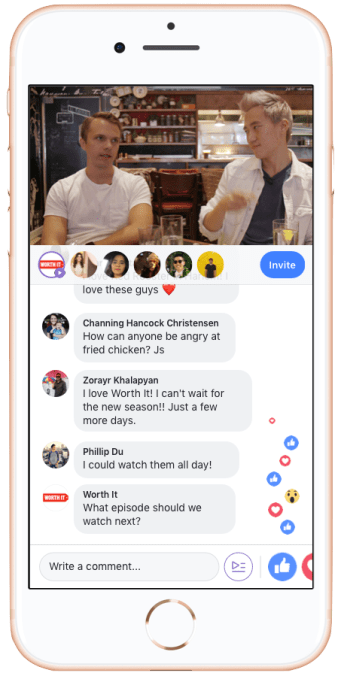 Watch Party had previously launched in Groups and been in testing with other types of accounts. But now any profile or business can post a Watch party invite to sync up with other users and simultaneously view videos they’ve discovered on Facebook.
Watch Party had previously launched in Groups and been in testing with other types of accounts. But now any profile or business can post a Watch party invite to sync up with other users and simultaneously view videos they’ve discovered on Facebook.
Watch’s content lineup is still lackluster compared to YouTube, Netflix, or even Snapchat Discover. CNBC reports Facebook is giving up on younger teens that are already ditching its app, and pivoting the video hub toward an older audience. Facebook is hoping a shared experience with users commenting together on clips could make Watch more appealing, but it’s a genuinely new behavior that may prove difficult to instill.
Facebook is also testing a few other tricks to breathe life into Watch. Pages and Groups will be able to schedule a Watch Party to draw more viewers, maybe by setting up a nightly gathering. Watch Parties with lots of activity will have their comments threaded so it’s easier to follow discussions.
And most interestingly, Facebook will try allowing Watch Party hosts to go Live picture-in-picture so they can commentate in real time. This could be a hit with celebrities, as it will make users feel like they’re sitting beside them watching TV together. Basketball star Shaq will test out the Live Commentating feature through his Page tomorrow.
Watch Party’s statistics sound impressive, with 12 million started from Groups so far, 7X more daily Watch Parties in Groups per day since its launch in July and 8X more commenting than on non-Live/synced videos. Pages are using it to let fans binge-watch playlists of their old videos, replay their TV content for users in different time zones and let fans ask each other and the hosts questions about recipes as they cook.
But given Facebook’s 2.2 billion total monthly users, billion-plus Groups users and the fact that measuring growth in multiples is easy when you start with a low number, the feature clearly hasn’t reached the zeitgeist yet.
Perhaps the best hope for Watch and Watch Party is a feature TechCrunch broke the news on last week: Facebook is now internally testing a Watch Party-like co-viewing feature inside Messenger. Baking the option into chat might be a lot more natural, especially in group texts.
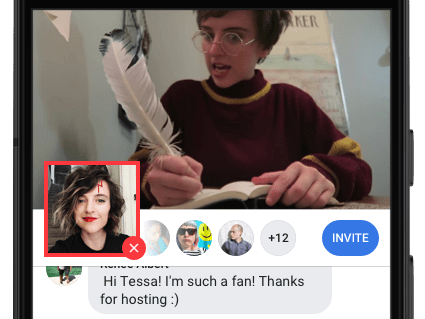
Facebook has been desperately trying to shift video consumption behavior from passive zombie viewing to interactive and social engagement with fellow viewers. But that only works if the content is compelling.
Beyond a reboot of MTV’s The Real World, nothing on Watch truly stands out. Facebook may need to open up its wallet and pay big for more tent pole shows to pull in users and hope they get lost commenting on clips with friends and like-minds.
Roughly one year after WhatsApp co-founder Brian Acton made his highly publicized exit from Facebook, another executive and early employee of the messaging platform is doing the same. Neeraj Arora, WhatsApp’s chief business officer, announced today that he would be “taking some time off to recharge and spend time with family.”
Facebook acquired WhatsApp for $19 billion in 2014 and pledged to allow the messaging giant to continue to operate independently under Acton and co-founder Jan Koum, who served as its chief executive officer until abruptly quitting over privacy and data concerns in April. Arora, who joined WhatsApp in 2011 from Google, was rumored to be the frontrunner to replace Koum as CEO. With him out the door, it’s unclear who will be tapped to lead WhatsApp.
In today’s announcement, Arora said he was “deeply indebted” to both Acton and Koum, “who entrusted me to be their business companion for so many years.”
Facebook subsidiaries WhatsApp and Instagram are both in periods of flux following the exits of their original founders, which are believed to be caused by quarrels with the social media giant’s CEO Mark Zuckerberg.
In what was one of the largest tech stories of 2018, Instagram co-founders Kevin Systrom and Mike Krieger announced they were leaving Facebook years after the company acquired their photo-sharing app for $1 billion. They shared the news in September, just a few months after Koum stepped down from WhatsApp.
According to The New York Times, Zuckerberg, over the course of the last year, had begun to assert more and more control over Instagram, upsetting its leaders.
According to TechCrunch’s Josh Constine, Koum, for his part, was unhappy “about how Facebook would monetize his app and the impact of that on privacy.” Both Acton and Koum departed Facebook before they fully vested from the multi-billion acquisition, meaning the pair chose to lose hundreds of millions of dollars over continued employment at Facebook.
Arora’s exit is further evidence that Facebook has entered a new era, one in which the company’s acquisition strategy may be in serious danger of long-term damage.
You can read Arora’s full post below.
A true apology consists of a sincere acknowledgement of wrongdoing, a show of empathic remorse for why you wronged and the harm it caused and a promise of restitution by improving ones actions to make things right. Without the follow-through, saying sorry isn’t an apology, it’s a hollow ploy for forgiveness.
That’s the kind of “sorry” we’re getting from tech giants — an attempt to quell bad PR and placate the afflicted, often without the systemic change necessary to prevent repeated problems. Sometimes it’s delivered in a blog post. Sometimes it’s in an executive apology tour of media interviews. But rarely is it in the form of change to the underlying structures of a business that caused the issue.
Unfortunately, tech company business models often conflict with the way we wish they would act. We want more privacy, but they thrive on targeting and personalization data. We want control of our attention, but they subsist on stealing as much of it as possible with distraction while showing us ads. We want safe, ethically built devices that don’t spy on us, but they make their margins by manufacturing them wherever’s cheap with questionable standards of labor and oversight. We want groundbreaking technologies to be responsibly applied, but juicy government contracts and the allure of China’s enormous population compromise their morals. And we want to stick to what we need and what’s best for us, but they monetize our craving for the latest status symbol or content through planned obsolescence and locking us into their platforms.
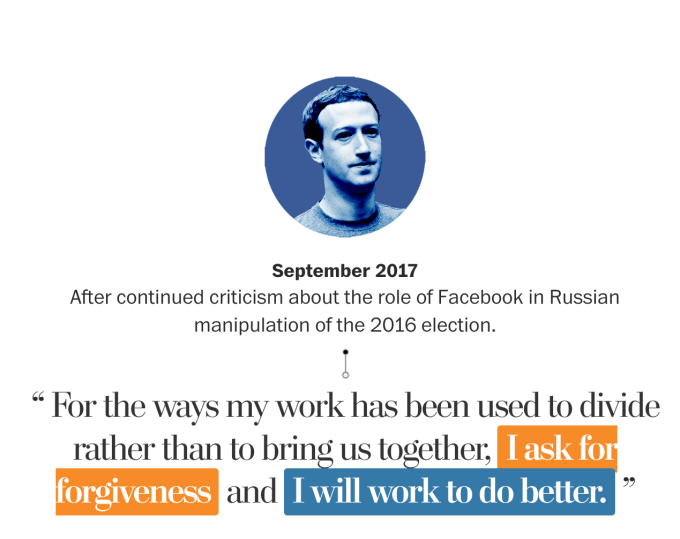
The result is that even if their leaders earnestly wanted to impart meaningful change to provide restitution for their wrongs, their hands are tied by entrenched business models and the short-term focus of the quarterly earnings cycle. They apologize and go right back to problematic behavior. The Washington Post recently chronicled a dozen times Facebook CEO Mark Zuckerberg has apologized, yet the social network keeps experiencing fiasco after fiasco. Tech giants won’t improve enough on their own.
The threat of us abandoning ship should theoretically hold the captains in line. But tech giants have evolved into fundamental utilities that many have a hard time imagining living without. How would you connect with friends? Find what you needed? Get work done? Spend your time? What hardware or software would you cuddle up with in the moments you feel lonely? We live our lives through tech, have become addicted to its utility and fear the withdrawal.
If there were principled alternatives to switch to, perhaps we could hold the giants accountable. But the scalability, network effects and aggregation of supply by distributors has led to near monopolies in these core utilities. The second-place solution is often distant. What’s the next best social network that serves as an identity and login platform that isn’t owned by Facebook? The next best premium mobile and PC maker behind Apple? The next best mobile operating system for the developing world beyond Google’s Android? The next best e-commerce hub that’s not Amazon? The next best search engine? Photo feed? Web hosting service? Global chat app? Spreadsheet?
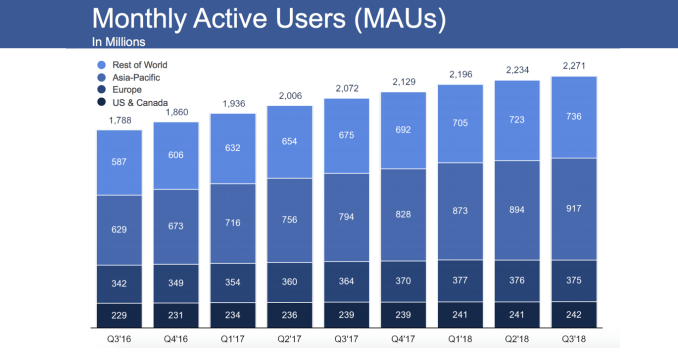
Facebook is still growing in the U.S. and Canada despite the backlash, proving that tech users aren’t voting with their feet. And if not for a calculation methodology change, it would have added 1 million users in Europe this quarter too.
One of the few tech backlashes that led to real flight was #DeleteUber. Workplace discrimination, shady business protocols, exploitative pricing and more combined to spur the movement to ditch the ride-hailing app. But what was different here is that U.S. Uber users did have a principled alternative to switch to without much hassle: Lyft. The result was that “Lyft benefitted tremendously from Uber’s troubles in 2018” eMarketer’s forecasting director Shelleen Shum told the USA Today in May. Uber missed eMarketer’s projections while Lyft exceeded them, narrowing the gap between the car services. And meanwhile, Uber’s CEO stepped down as it tried to overhaul its internal policies.
This is why we need regulation that promotes competition by preventing massive mergers and giving users the right to interoperable data portability so they can easily switch away from companies that treat them poorly
But in the absence of viable alternatives to the giants, leaving these mainstays is inconvenient. After all, they’re the ones that made us practically allergic to friction. Even after massive scandals, data breaches, toxic cultures and unfair practices, we largely stick with them to avoid the uncertainty of life without them. Even Facebook added 1 million monthly users in the U.S. and Canada last quarter despite seemingly every possible source of unrest. Tech users are not voting with their feet. We’ve proven we can harbor ill will toward the giants while begrudgingly buying and using their products. Our leverage to improve their behavior is vastly weakened by our loyalty.
Regulators have failed to adequately step up either. This year’s congressional hearings about Facebook and social media often devolved into inane and uninformed questioning, like how does Facebook earn money if its doesn’t charge? “Senator, we run ads,” Facebook CEO Mark Zuckerberg said with a smirk. Other times, politicians were so intent on scoring partisan points by grandstanding or advancing conspiracy theories about bias that they were unable to make any real progress. A recent survey commissioned by Axios found that “In the past year, there has been a 15-point spike in the number of people who fear the federal government won’t do enough to regulate big tech companies — with 55% now sharing this concern.”
When regulators do step in, their attempts can backfire. GDPR was supposed to help tamp down on the dominance of Google and Facebook by limiting how they could collect user data and making them more transparent. But the high cost of compliance simply hindered smaller players or drove them out of the market while the giants had ample cash to spend on jumping through government hoops. Google actually gained ad tech market share and Facebook saw the littlest loss while smaller adtech firms lost 20 or 30 percent of their business.
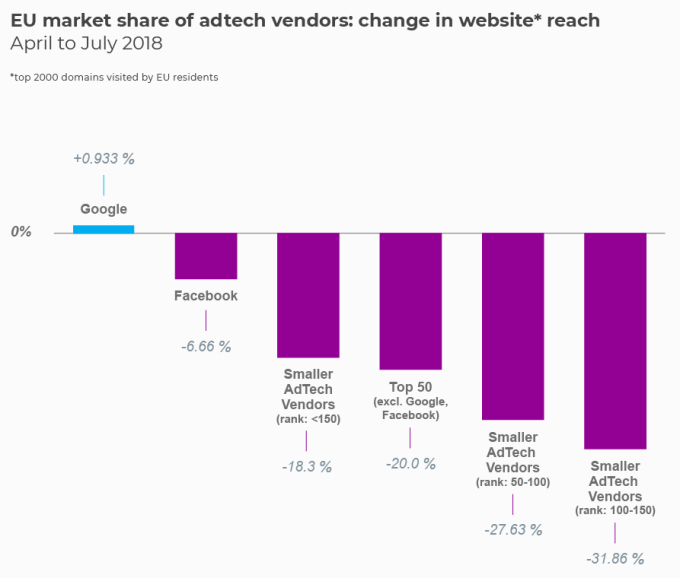
Europe’s GDPR privacy regulations backfired, reinforcing Google and Facebook’s dominance. Chart via Ghostery, Cliqz and WhoTracksMe.
Even the Honest Ads act, which was designed to bring political campaign transparency to internet platforms following election interference in 2016, has yet to be passed, despite support from Facebook and Twitter. There’s hasn’t been meaningful discussion of blocking social networks from acquiring their competitors in the future, let alone actually breaking Instagram and WhatsApp off of Facebook. Governments like the U.K. that just forcibly seized documents related to Facebook’s machinations surrounding the Cambridge Analytica debacle provide some indication of willpower. But clumsy regulation could deepen the moats of the incumbents, and prevent disruptors from gaining a foothold. We can’t depend on regulators to sufficiently protect us from tech giants right now.
The best bet for change will come from the rank and file of these monolithic companies. With the war for talent raging, rock-star employees able to have huge impact on products and compensation costs to keep them around rising, tech giants are vulnerable to the opinions of their own staff. It’s simply too expensive and disjointing to have to recruit new high-skilled workers to replace those who flee.
Google declined to renew a contract with the government after 4,000 employees petitioned and a few resigned over Project Maven’s artificial intelligence being used to target lethal drone strikes. Change can even flow across company lines. Many tech giants, including Facebook and Airbnb, have removed their forced arbitration rules for harassment disputes after Google did the same in response to 20,000 of its employees walking out in protest.

Thousands of Google employees protested the company’s handling of sexual harassment and misconduct allegations on November 1.
Facebook is desperately pushing an internal communications campaign to reassure staffers it’s improving in the wake of damning press reports from The New York Times and others. TechCrunch published an internal memo from Facebook’s outgoing VP of Communications Elliot Schrage, in which he took the blame for recent issues, encouraged employees to avoid finger-pointing, and COO Sheryl Sandberg tried to reassure employees that “I know this has been a distraction at a time when you’re all working hard to close out the year — and I am sorry.” These internal apologies could come with much more contrition and real change than those paraded for the public.
And so after years of us relying on these tech workers to build the product we use every day, we must now rely that will save us from them. It’s a weighty responsibility to move their talents where the impact is positive, or commit to standing up against the business imperatives of their employers. We as the public and media must in turn celebrate when they do what’s right for society, even when it reduces value for shareholders. If apps abuse us or unduly rob us of our attention, we need to stay off of them.
And we must accept that shaping the future for the collective good may be inconvenient for the individual. There’s an opportunity here not just to complain or wish, but to build a social movement that holds tech giants accountable for delivering the change they’ve promised over and over.
For more on this topic: